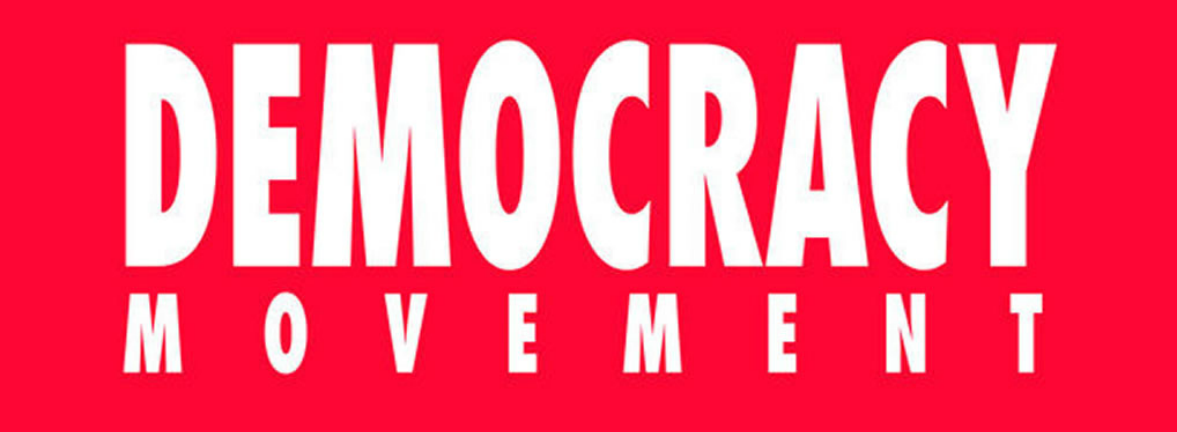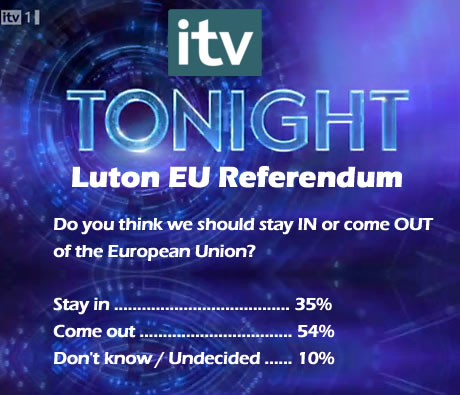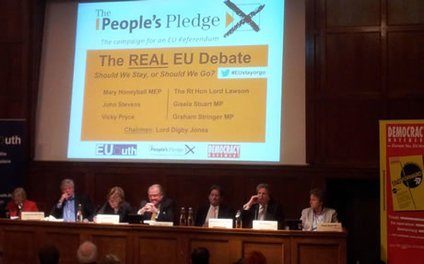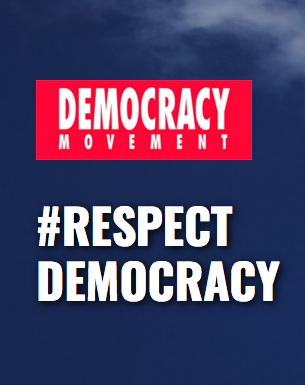Follow us on TwitterKeep up with our latest EU campaign news and commentary by following us on Twitter.
Click below to view our profile and follow: |
|
Result of the ITV Tonight Luton EU Referendum, in which the DM went
head-to-head with the European Movement in a local in/out referendum in a campaign seen by 3 million ITV viewers. (October 2008) Lord Lawson (Conservative), Graham Stringer MP (Labour) and Gisela
Stuart MP (Labour) speak for the DM during a People's Pledge EU debate. (December 2013) Respect Democracy campaign - a dedicated website highlighting which MPs were respecting the result of the EU referendum. (November 2019)
|
Our historyThe Democracy Movement was founded in 1998 through a merger of the Referendum Movement - the non-party, grassroots 'Keep the Pound' campaign which came out of the Referendum Party's 1997 general election campaign - and the Euro Information Campaign established by the Yorkshire businessman Paul Sykes.
Through creative grassroots campaigning and network-building combined with high profile advertising, in the space of a few years the Movement grew from 5,000 to 325,000 registered supporters, quickly becoming Britain's largest EU-critical campaign group and rivalling the membership of Britain's main political parties. Political successes include playing a leading grassroots role in the campaign to keep the UK out of the euro (1998-2002) and securing a pledge from Tony Blair of a referendum on the original EU Constitution (2002-2005). The DM also campaigned for that referendum to be delivered with respect to its successor - the Lisbon Treaty (2005-2008), which came down to a close vote in Parliament. In the course of this campaign, the DM was selected by the ITV Tonight programme to run the highly successful 'Out' campaign in a mini EU referendum held in Luton - a result seen by 3 million ITV viewers. The 54% vote to leave the European Union remains the among highest ever polling figures for exit - and this wasn't just an opinion poll, but an actual vote. The DM has also campaigned against the scale of Britain's contribution to the EU budget, through the then novel approach of breaking the figure down into daily and weekly amounts and comparing those to the financial needs of public services such as the NHS. Former Prime Minister David Cameron claimed subsequently to have secured, for the first time, a real terms cut to the UK's payments into the EU budget. In 2011, the DM was instrumental in establishing - and strongly supported - the independent People's Pledge campaign for an in-out EU referendum, which is credited with a major role - if not the definitive role - in securing a government u-turn to support holding the EU referendum. This independent, multi-faceted campaign, based on a unique concept of a constituency-by-constituency 'people's pledge', deployed a number of ground-breaking techniques - from a novel website recording MPs' stances, votes and video pledges, to conducting dramatic, constituency-wide referendums in marginal seats. It was described by Conservative MEP Daniel Hannan as "arguably the most successful pressure group in recent history". The EU referendum on 23 June 2016 was the culmination of the Democracy Movement's campaigns since 1998 and we were one of the leading groups working independently for a Leave vote during the referendum. In addition, both our long-term slogan - Europe Yes, EU No - and the basis of our popular Stop the Cheques campaign, which contrasted the scale of funds paid daily and weekly to the EU with the financial shortfalls in public services like the NHS - were adopted by the official EU referendum Leave campaign, Vote Leave. Since 2016, the has DM continued to campaign for the EU referendum result to be respected, culminating ahead of the pivotal 2019 general election in our Respect Democracy campaign. This featured a dedicated website tracking multiple variables, including how each MP had voted in Parliament on holding an EU referendum, how they had voted in all the 'meaningful votes' since, together with whether their constituency had voted Leave in the referendum. The Respect Democracy website, allowing MPs to be looked up by voters' postcodes, analysed this data to offer a verdict on whether each MP was respecting democracy, enabling voters to make an informed decision on who to trust with their vote. The result of the2019 general election ensured the delivery of Brexit. Today, the DM continues to work towards three remaining objectives:
Please register your support here - it's free to join in - and help us to continue to promote and defend democracy. |
Who we are
|
The Democracy Movement is a large, non-party network of registered supporters and activists, backed by a small leadership team headed by its director Stuart Coster.
We are a multi-faceted campaign, working with our allies in parliament, conducting and publishing research, promoting our case in the media, and campaigning at the grass-roots to win support for our ideas and direct pressure for change onto political decision-makers. The Democracy Movement works with those who share our beliefs, of all political parties and of none, without endorsing parties or individuals at elections, and alongside other groups similarly committed to promoting, and challenging threats to, democracy. We will also continue to work with our allies in other European countries fighting similar debates. It's free to support our campaigns and to get involved. However, our activities are funded only by voluntary donations from individual supporters. So if you like our work, please consider helping us with a donation so that we can continue. |
Our principles
|
The Democracy Movement is an independent pressure group campaigning to promote and defend liberal democracy in Britain and across Europe.
Beyond diverse views about Brexit itself, at its core the EU referendum delivered big gains for those seeking greater democratic rights over law-making and a stronger say in how we are governed, through the return of political decision-making from EU institutions to Westminster. While the European Union was always the biggest and most obvious factor undermining our democracy, leaving does not in itself solve all of the UK's democratic flaws. Key elements of UK liberal democracy are in need of reform and we will focus our campaigns particularly on improving our fragmented election laws and ensuring they are respected by candidates, the status and powers of the oversized House of Lords, improving connections between people and parliament between elections towards better law-making, as well as respect for the open and free exchange of views in political debate. Across Europe, democracy is also being undermined fundamentally by the euro (economic and monetary union) and the wider EU drive to create a Brussels-based system of government, which is steadily resulting in all major decisions being taken at the European Union centre by undemocratic institutions. Our vision instead for our continent is that of a Europe of Democracies that facilitates elected governments co-operating together on issues transcending national boundaries where there is voluntary, common agreement - an objective that will obviously entail radical changes to the current structure of the EU or its complete replacement with a new, slimmer, more efficient and effective organisation. Removing the EU's legal superiority over its member countries and making Europe's elected national parliaments legally supreme once again is a necessary first, if not sufficient, step towards a democratic re-Enlightenment in our continent. We are pro-European Because of our commitment to diversity, democracy, and decentralisation on our continent, we consider ourselves to be the true pro-Europeans in the EU debate. We believe that those who are trying to construct a pan-European government are working against the interests of all ordinary European people. The more decision-making is centralised in remote EU institutions, the less voting power ordinary European citizens possess. The key contradiction of the EU project is that it seeks to concentrate ever more law-making power in Brussels when single policies simply cannot suit the different, local needs and aspirations of Europe's diverse countries and peoples. Europe has never naturally been a single political entity and the various attempts to impose an artificial unity have ended in disaster: the empires of Charlemagne, Napoleon and Hitler being examples. Europe's great cultural and economic advances - the Renaissance, the Enlightenment, the Industrial Revolution - took place when and because our continent was a collection of diverse, competing entities free from the suffocation of a single dominant ideology and corrupt centre of power. We are internationalist We also envisage the peoples of Britain and other European countries having an outward-looking attitude to those countries and continents that lie beyond the boundaries of the EU. We are internationalists and reject emphatically not only the 'little Englander' but also the 'little European' mindset often evident in Brussels and amongst the EU's supporters. In the age of e-commerce and ever faster and cheaper transport, it seems bizarre that there is an obsessive, out-of-date push to create an inherently rigid and cumbersome Europe-wide state. Our long-term vision Our long-term vision is of a more responsive and effective democracy here in Britain, together with a Europe of Democracies to replace today's EU - of countries that trade together, enjoy cultural exchange with each other, and co-operate voluntarily where it makes sense to do so. The EU's future, or lack of one, is properly a matter for its remaining members to define. But in the quickly-changing era of globalisation, the emphasis today must be on the ability of countries to adapt with speed to changing circumstances, not creating enormous, slow-moving political structures. The EU's vaccine failures have only served to confirm, once and for all, such longstanding criticisms of EU institutions - with devastating consequences for lives within its remaining members. Inaction, or failure to reform in a more democratic direction, are no longer an option. The need now is for a lighter, more flexible structure that, for example, combines the roles of the (non-EU) Council of Europe and the European Free Trade Area. A structure that does not seek to put up barriers on our continent to countries that have not agreed to hand over decision-making to central EU institutions. That ideology - the founding ideology of the EU - belongs in the past. Our campaigns will address how Europe can move beyond that outdated EU. |
Our status
|
The Democracy Movement is a registered company limited by guarantee - a special non-profit status - registration no. 3673846. In accordance with legal requirements we file annual accounts and the details of our directors every year and these are available from Companies House to anyone who wishes to view them.
|
|
The Democracy Movement, Marlborough House, High Street,
Hartley Wintney, Hampshire RG27 8NY T: 020 3637 4546 E: campaign @ democracymovement.org.uk © 2023 Democracy Movement. All rights reserved. |
Our legal status is as a registered company, limited by guarantee - a non-profit status. No. 3673846. In accordance with legal requirements, we file annual accounts and the details of our directors every year with Companies House.
Privacy statement: We will not pass on your contact details to any other organisation or use them for any purposes other than promoting the activities of our campaigns. |





